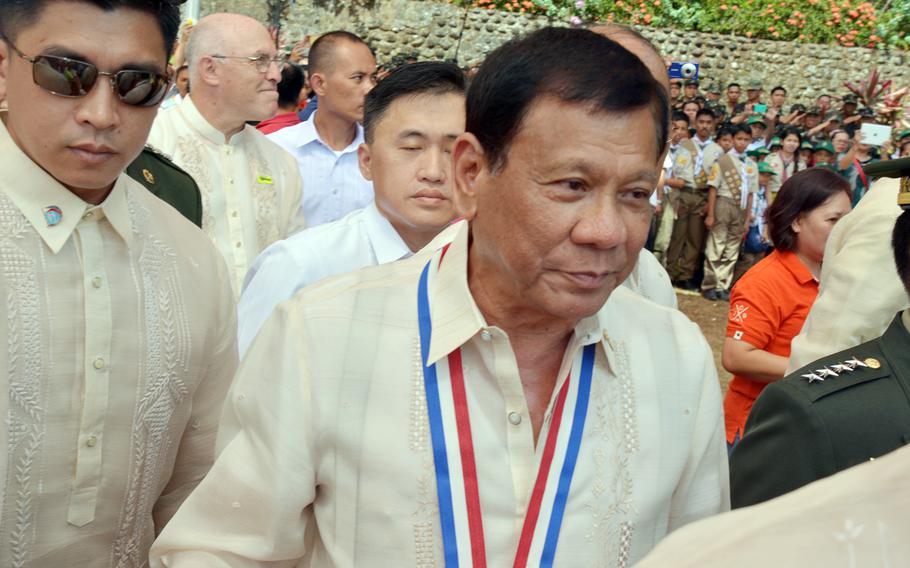
Then-Philippine President Rodrigo Duterte arrives at Mount Samat to commemorate the 75th anniversary of the fall of the Bataan Peninsula to Japanese forces during World War II, April 9, 2017. (Seth Robson/Stars and Stripes)
Former Philippine President Rodrigo Duterte says the Chinese ambassador to Manila told him the country would be a target if America launched attacks on China from bases in the islands.
In comments reported Wednesday by the Manila Bulletin, Duterte said Chinese Ambassador Huang Xilian issued the warning to him during a recent meeting.
“I reminded [Huang] again that the Philippines does not have a quarrel with China,” Duterte said, according to the Bulletin, “but his answer to me was, ‘If you provide places where there can be an aggressive action to China, the Philippines would always be a target.’”
Duterte’s time in office was marked by warm words for Beijing and criticism of the 2014 Enhanced Defense Cooperation Agreement that gives U.S. forces the right to operate from bases in the islands.
The relationship between the allies has improved following the election of President Ferdinand Marcos Jr. last year. In February, officials added four new sites to five locations named in the original base-sharing pact.
However, Duterte claims there are 17 sites in the agreement, according to the Bulletin.
“In the interest of the public’s right to know, there should be an open discussion,” he said. “Americans should come clean and give us a truthful narration or narrative or an explanation and identify the places where they have installed bases here in the Philippines.”
The result of a U.S. attack on China would be retaliation with nuclear weapons against the Philippines, Duterte said, according to the Bulletin.
“[Americans] who are farther away have ‘anti-missile’ missiles,” he said. “You can shoot them down before they can enter your airspace. The problem is, here in the Philippines, what are the stakes for us? Nothing. It would not only be destructive. I believe that the Philippines would be a graveyard if war comes.”
Stephen Dove, a press officer at the U.S. Embassy in Manila, in a Thursday email responding to questions about Duterte’s comments, referred to earlier U.S. government statements, including an April 19 U.S. Embassy statement that said the U.S. and Philippines militaries worked closely together through a multi-year annual planning process to identify all nine EDCA locations, which were then approved by both governments.
It’s unlikely that confrontation or heightened tension around Taiwan would leave the Philippines untouched, according to Ian Chong, an associate professor of political science at the National University of Singapore.
“Manila is already reporting ongoing harassment of Philippine Coast Guard and civilian fishing vessels in waters it disputes with Beijing,” he told Stars and Stripes in an email Thursday. “In that sense, the Philippines has already been under pressure for some years even beyond [Chinese] efforts to control Taiwan.”
Duterte’s comments aren’t supported by the facts and won’t have a major impact on the base-sharing agreement, according to Carlyle Thayer, an emeritus professor at the University of New South Wales.
“The United States will never unilaterally initiate an armed conflict with China, especially from the Philippines where no strategic nuclear forces are based to support such an action,” he wrote in an email Thursday.
The former president’s comments don’t reflect public opinion in the islands, where most people are pro-American, according to Patricio Abinales, a Philippines expert at the University of Hawaii.
“He can shout his pro-China position all he wants but people will just say, ‘he has always been pro-China’ but he is not in power anymore,” he said by email Thursday.